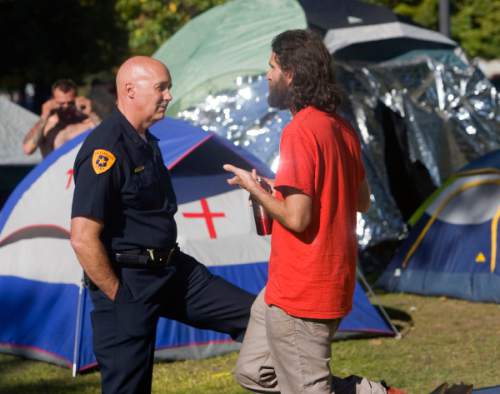This is an archived article that was published on sltrib.com in 2015, and information in the article may be outdated. It is provided only for personal research purposes and may not be reprinted.
A national immigrant advocacy group on Wednesday ballyhooed that 18 law-enforcement leaders nationally — including two Utah top cops — were urging the Senate Judiciary Committee to reject the "Stop Sanctuary Cities Act."
But one of those Utah leaders, state Public Safety Commissioner Keith Squires, later said he did not intend specific opposition to that bill when he signed a letter organized by the National Immigration Forum.
The letter urges senators not to require local police to enforce federal immigration laws — and does not mention the "Stop Sanctuary Cities Act" by name. But the group issued a press release saying the letter opposes that legislation as irresponsible and harmful to local policing.
Squires' office issued a written clarification late Wednesday afternoon saying he "does not support so-called sanctuary cities if the interpretation is that they are in violation of federal law." Sanctuary cities refuse to turn over undocumented immigrants to immigration officials even if caught committing serious crimes.
"The commissioner fundamentally supports the philosophy and practice of community policing where agencies collaborate with the [immigrant] community to identify and solve community problems," the statement said.
"His understanding of this letter's intent was to inform legislators that defunding federally supported programs could adversely affect public safety in our community," it added.
Squires made the clarification after The Tribune asked Gov. Gary Herbert's office if he supported apparent opposition by Squires to that immigration bill.
Herbert spokesman Jon Cox said the governor opposes the idea of sanctuary cities, and believes it is the job of the federal government to enforce immigration laws.
The other Utah leader who signed the letter, Salt Lake City Interim Police Chief Mike Brown, has already been an outspoken critic of using local police to enforce federal immigration laws — saying it creates distrust with immigrants.
The "Stop Sanctuary Cities Act" is scheduled for debate Thursday by the Judiciary Committee, where both Sens. Orrin Hatch and Mike Lee, R-Utah, are members. The bill is the latest in reaction to increased attention on immigration after a murder by an immigrant last month in San Francisco, a sanctuary city.
The House passed similar legislation July 23. Reps. Mia Love and Jason Chaffetz, both R-Utah, voted for it. Reps. Rob Bishop and Chris Stewart, both R-Utah, were absent.
The letter says "a number of proposals to defund so-called sanctuary cities sweep too broadly, punishing state and local law-enforcement agencies that engage in well-established community policing practices," such as promising not to check the immigration status of people who report crimes or help catch criminals.
The letter said that by seeking to "require state and local law enforcement to carry out the federal government's immigration-enforcement responsibilities, the federal government would be substituting its judgment for the judgment of state and local law-enforcement agencies."
Congress should instead "focus on overdue reforms of the broken immigration system to allow state and local law enforcement to focus their resources on true threats — dangerous criminals and criminal organizations," it suggests.
Brown gave a speech last month to the national convention in Salt Lake City of the League of United Latin American Citizens in which he told Latinos, "We will not ask you to prove if you are American."
He explained, "Requiring police to enforce federal immigration law undermines the trust and cooperation of immigrant communities, which are essential elements of community oriented policing."
Brown is following in the footsteps of former Salt Lake City Chief Chris Burbank, a longtime national spokesman for keeping local police out of immigration enforcement. Burbank was forced to resign earlier this summer by Mayor Ralph Becker over his handling of a sexual-harassment case.



